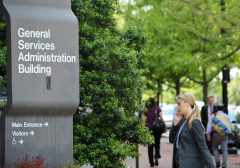Clinton pledges to make USDS permanent if elected

Presumptive Democratic nominee Hillary Clinton will continue the digital government progress of President Barack Obama if elected this fall, making the U.S Digital Service a “permanent part of the executive branch,” her campaign said in a fact sheet this week.
The pledge comes as part of her plan for a “smarter and more innovative government” — using “technology and data to provide better services to the American people.”
Clinton says that while the “U.S. Digital Service is already delivering results — making it easier for students and their families to compare college options, and easier for applicants to file immigration forms,” it’s only in its infancy and without a certain future.
“Hillary will make the USDS and other digital services a permanent part of the executive branch to ensure that technical innovation becomes an ongoing feature of American governance,” the factsheet reads. “There should be a constant flow of technology and design experts working to make it easier for Americans to get affordable health insurance, apply for student loans, or get the veterans benefits they deserve.”
Along with support for USDS and its expansion in agencies governmentwide, Clinton would support other digital services teams, like the General Services Administration’s 18F and Presidential Innovation Fellows, and agency innovation labs.
Relying on USDS as an executive branch digital SWAT team, much like President Obama has, Clinton plans to have USDS redesign the top 25 citizen-facing government websites and create a “Yelp for government” platform that allows citizens to rate them.
More broadly, she positions herself to follow on where the Obama administration left off, working to eliminate internal barriers in the cumbersome federal IT modernization process by streamlining procurement, getting “rid of unnecessary internal red tape that prevents government from developing intuitive and personalized digital experience that they have come to expect from great consumer internet companies,” and buying more cost-effective IT systems.
She’ll also look to open up more government data, harden agencies’ networks against intrusion, crowdsource and incentivize innovation from American citizens outside government, and use tech and data-driven dashboards to drive government accountability, all initiatives President Obama launched during his eight years in office.
“She will encourage government agencies to consider innovative tools like bug bounty programs, modeled on the Defense Department’s recent ‘Hack the Pentagon’ initiative, to encourage hackers to responsibly disclose vulnerabilities they discover to the government,” the release says of federal cybersecurity. “And she will bolster the government’s ability to test its own defenses by increasing the capacity of elite, cleared government red teams to help agencies find and fix vulnerabilities before hackers exploit them.”
Clinton’s focus around federal IT is only one — and the last mentioned — part of her broader five-part Tech and Innovation Agenda.
FedScoop reached out to Clinton’s team for additional comment, but did not receive a response prior to publication.
“Hillary Clinton’s priority is to harness the power of technology and innovation so that it works for all Americans, creating good-paying jobs throughout the country,” the factsheet says. “Doing this right will not only boost economic growth, it will lead to immeasurable social benefits — home monitoring options for seniors will improve health outcomes and relieve pressures on family members; interoperable and next-generation public safety systems will mean faster response times and safer communities; smarter transportation networks will lead to less congestion, fewer accidents, and lower energy costs; and widely-deployed digital infrastructure will allow for wrap-around learning for our students in the home and in our schools.”
“Hillary believes that with the right public policies, we can ensure that technology is a force for broad-based growth, reducing social and economic inequality, and securing American leadership on the global stage,” it says.
Contact the reporter on this story via email at Billy.Mitchell@FedScoop.com or follow him on Twitter @BillyMitchell89. Subscribe to the Daily Scoop to get all the federal IT news you need in your inbox every morning at fdscp.com/sign-me-on.






